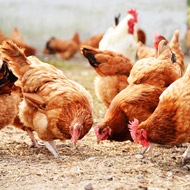H5N8: Wales to lift housing restriction

The current zone requires all keepers of poultry and other captive birds to house their birds indoors.
The Welsh Government has announced it will not be replacing its avian influenza prevention zone after it expires on 30 April.
Introduced on 28 February, the current zone requires all keepers of poultry and other captive birds to house their birds indoors, or take steps to ensure they are kept separate from wild birds, and to enhance biosecurity.
Outbreaks of avian influenza H5N8 were confirmed across the UK between December 2016 and March this year, and prior to that, across Europe, North Africa and the Middle East.
However, the APHA's latest veterinary risk assessment suggests there remains a low to medium risk of resident wild waterfowl becoming infected. Meanwhile, the risk of exposure for poultry farms is low but heightened, and will depend on each farm's biosecurity measures. This level is consistent with that in November last year, when sporadic outbreaks and occasional wild bird findings were being reported across Europe.
A temporary ban on gatherings of some species of bird will remain whilst additional evidence is being considered.
Although the decision is welcome news, the chief veterinary officer for Wales, Christianne Glossop said bird keepers must remain alert for signs of the disease and contact their private vet if they have concerns. Any suspected avian influenza must be reported immediately to the APHA.
It is also essential for keepers to maintain effective biosecurity, for example through self assessment forms, cleansing and disinfecting all clothing, equipment and vehicles, and implementing suitable pest control measures to prevent contact between their birds and wildlife.



 The Federation of Independent Veterinary Practices (FIVP) has announced a third season of its podcast, Practice Matters.
The Federation of Independent Veterinary Practices (FIVP) has announced a third season of its podcast, Practice Matters.